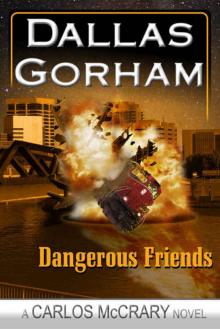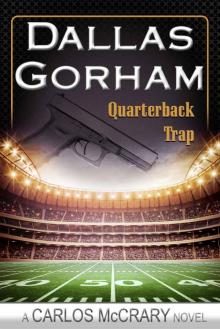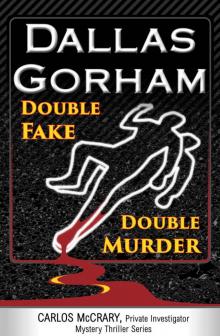- Home
- Dallas Gorham
Dangerous Friends (A Carlos McCrary novel Book 4) Page 8
Dangerous Friends (A Carlos McCrary novel Book 4) Read online
Page 8
“This here’s the launching slip, thirty feet wide by fifty feet long,” the manager boasted. “We can handle any size boat you got.” The dock made a right turn away from the river and a U around three sides of the slip before returning to the riverside. On the far side and end, a large concrete apron filled the area between the water and the storage building. “We launch the dry storage boats down here when the owners are coming to use them.”
Fifty yards farther, Eddie stopped at the entrance to a giant steel storage building. Its paint was once white but had aged to a dingy gray, peeled on the west side where the Florida sun punished it. The twin sliding doors angled crookedly on their tracks. A large padlock hung open through the hasp on the left door.
“This here is our enclosed dry storage area.” Twin rows of giant galvanized steel cubbyholes faced each other from both sides of the ancient building. Each of the four levels held row after row of boats stacked on twin rails inside each cubbyhole. Two huge forklifts waited against the back wall, their long padded arms stretching empty, waiting to be summoned to lift boats off the racks.
“Which, uh, garage was the Outrage taken from?”
“We call them ‘slips.’ Third row up, left side, almost to the back. I’ll show you.” Terazzo strode off toward the rear of the cavernous space. He stopped twenty feet from the back wall and turned to his left. “Right there.” He pointed to an empty slip.
“How do I get up there?” I asked.
“There’s stairs at each end of the rack. Walk between the wall and the rack, right back there, see it?”
“Yeah, thanks.” The galvanized metal steps clanged as I climbed them two at a time. A catwalk ran behind each row of slips. I sidestepped down the catwalk behind the two boats at the rear of the building until I reached the empty slip.
“Careful,” Eddie called from the floor. “Don’t want you falling through or nothing. That could ruin your whole day.” He laughed.
“Thanks. I’ll hang on.”
The empty slip had twin steel I-beams stretching thirty-five feet from the catwalk to the front of the rack. Slabs of hard rubber were wrapped around the beams and held in place every foot by plastic straps to protect the fiberglass boat hulls from scratches. Here and there, a few straps had snapped and the rubber had broken into pieces and fallen off, exposing the steel beam. I studied the boats on either side of the empty slip. There were no padlocks, no chains around the rails or motors to secure the boats in place, only gravity and their own weight. Anyone with access to the forklifts could steal any boat if the sliding doors at the front were left unlocked at night.
I snapped a few pictures with my cellphone and made my way down to the ground. I walked over to the forklifts. Keys dangled from both ignitions. The marina owners must have figured no one would be stupid enough to steal a forklift big enough to carry a twenty-thousand-pound boat. They were right. The thief hadn’t stolen the forklift, just borrowed it long enough to take the boat out of dry storage and launch it in the Seeti River.
I looked for security cameras as I walked back to the office. There were none in the dry storage building, but I spotted two at the ends of the courtesy dock.
Snoop looked up when we walked into the marina office. “It didn’t take long to find the theft. There are two security cameras and they take one frame per second. Come look at this.”
The manager and I stood behind Snoop and looked over his shoulder at the monitor. “It was ten days ago, early Saturday morning,” he said.
The monitor showed the courtesy dock from the north end looking south. The security lights made the picture plenty bright. The dock dwindled toward a vanishing point near the top of the screen. The launching slip looked like a thin black line cutting the dock in two pieces near the top of the picture. The dry storage building doors were closed.
“I set it for real time. It will show one frame per second like it was recorded. It’s 2:18 a.m. Watch the dock.” Snoop tapped a key and a figure appeared at the far end of the dock and jumped a few feet toward the camera with each second. Then it jumped its way around the launching slip. “I can calculate his speed based on how long it takes to walk around the launching slip. Carla said the slip is 30 x 50. He had to walk 130 feet. It took twenty seconds. That guy walked fast, more than four miles per hour. He’s not running; that might attract attention. But he’s walking as fast as he can without jogging.”
The figure turned toward the dry storage building and stopped at the locked doors. Snoop froze the picture. “Notice anything unusual about that guy, Chuck?”
“Besides the long beard? He’s wearing a hoodie and a baseball hat on a warm, muggy night.”
Eddie leaned closer to the monitor. “No way you make out a face from this distance behind that hoodie and hat. Oldest trick in the book, wearing a fake beard. Heck, it might be a woman, trying to throw us off.”
I winked at Snoop behind Eddie’s back. “Yeah, that does look like a bogus disguise.”
“I’ll zoom it.” Snoop enlarged the image, but as it got larger, the pixels became large squares and the resolution was insufficient to print a mug shot. But the hat had a red bill and a big script A on the black crown that looked like the Atlanta Braves. I made a note.
Snoop started the video again, and the figure bent over the lock and stayed that way for a minute. “He didn’t have a key or he could’ve opened it sooner. He must’ve picked it.” The figure straightened up and slid the left door open a foot. He slipped sideways through the opening and the door slid closed again.
Snoop touched the keyboard. “Nothing happens for six minutes. I’ll skip ahead.” The monitor showed 2:26 a.m. and the left door slid open. A figure crossed the opening to the right door and slid it back halfway. He disappeared inside the building. A few seconds later the nose of a boat, concealed under a blue boat cover, eased through the door. The body of the forklift emerged, bounced over the track of the sliding doors, and rolled onto the pavement.
The forklift glided toward the launching slip. “Snoop, notice how smoothly he made the turn. This ain’t his first rodeo. That guy knows how to operate a forklift.”
“Yeah, but Carla said he doesn’t know squat about launching the boat. Watch.” The forklift stopped on the near side of the launching slip and the boat jerked and bounced on the outstretched arms.
“That’s not the way we do it,” Eddie said. “You gotta take it around to the end.”
The forklift stopped, and its arms bounced up and down with the boat’s weight. The boat elevated a few feet and stopped, bouncing again. When it stopped, the forklift backed up, turned, and moved to the rear of the launching slip.
Eddie nodded his approval. “Now he’s figured out how to do it.”
The man lowered the boat into the water, grabbed a line, and tugged it off the submerged forklift arms. He tied the boat and returned the forklift to the storage building, relocked the doors. Within a few minutes, he had eased the boat into the main channel and turned upstream. He slammed the throttles forward and the Outrage leaped ahead, throwing him back against his seat. The prop wash swirled the peaceful river into choppy turbulence in his wake. In seconds the boat climbed the bow wave up on plane and charged upstream. Its wake splashed and rebounded against the docks and seawalls on both sides as it disappeared around a bend in the river. The monitor showed 2:45 a.m.
Eddie said, “He sure made it look easy, didn’t he?”
“Can I copy the video, Eddie?”
“I gave a copy to Snoop,” said Carla.
“Any suggestions to improve our security?” Eddie asked.
I spread my hands. “A few. First, I would lock the forklift keys in the office every night. Then I’d get a better padlock for the doors. For a few dollars more, you can buy a lock that can’t be picked in thirty seconds. I’d get four cameras for inside the dry storage building, one in each corner, and a couple for your parking lot. If you had a parking lot camera, we might have known what kind of car the thief used. Maybe even his
license plate. Good cameras don’t cost much anymore.”
We said our goodbyes.
Snoop waited until we were in our car in the Prime Marina parking lot. “That sure looked like your description of James Ponder on the security video. We need to ask Michelle to describe the baseball hat Ponder wore that night.”
I started the van. “I’m ninety percent sure he was the thief.”
“Ninety percent, my ass. How many skinny guys have a Taliban beard? Remember Rule Three: There’s no such thing as a coincidence. He’s a prime suspect until proven otherwise. And he’s from Georgia—could be a Braves fan.”
“Right. I’d like to know where he learned to handle a forklift.”
Chapter 19
I handed Snoop a sub sandwich and dropped into a chair. A few months before, Java Jenny had expanded to the next door space and added a sandwich and pizza shop. We sat at the same end table where we’d interviewed Michelle that morning. Were things really moving that fast?
He unwrapped the sandwich. “Turns out our guy Ponder had a summer job during his undergraduate days working at a Home Depot. I found it on his Facebook page. My guess is that’s where he learned to drive a forklift.” He tasted his sandwich. “Too much mayo.”
“I’m buying, so don’t complain.”
“You mean Michelle Babcock’s parents are buying.” He tore open a bag of tortilla chips. “You want me to tail Ponder? He knows you.”
“No. We’ve got the dirt on Ponder. I’ll get Frank Bennet to follow Shamanski for a couple of days and see what he comes up with.” Frank Bennett was a young Port City cop I used from time to time when he was off duty. “I’ll follow Wallace; he doesn’t know me from Adam.” I had kept the paper from Monday with Wallace’s address on it. I punched it into my tablet, then I switched to Google Street View. “Something strange about Wallace’s address. He shouldn’t be living in a cheap place like that.”
Snoop’s mouth was full, but that didn’t stop him from talking. “How so?”
“Look at this.” I shoved the tablet to Snoop. “Wallace is a tenured professor. That means he makes a six-figure income. And with his government grants, he’s gotta pull down a half-million a year, net. I checked the photos on his Facebook page. He wears expensive clothes, and he drives a Tesla. Not surprising, given his views on fossil fuels. But this place—” I tapped the table beside the tablet. “That’s a blue-collar apartment in a blue-collar neighborhood. That’s inconsistent with the upscale car and expensive clothes.”
“So maybe he’s a man of the people,” said Snoop.
“I don’t think so. His apartment complex has open parking lots—no private garages.”
Snoop sipped his iced tea. “So what?”
“So he has no place for a charging station for his Tesla.”
“You don’t buy an electric car without a place to charge it.”
“Michelle is tight with Wallace. I’ll call her.” I did. “Michelle, Wallace drives a Tesla, right?”
“That’s right. Why? Are you following him?”
“Not yet. How does he charge it?”
“There’s a public parking lot a block away with a free charging station and free parking for electric cars.”
“Yeah, yeah. I remember. I read it in the Pee-Jay.” In a public seizure of political correctness, the City Council of Port City had chosen to buy an electric car charging station for one spot in each downtown parking lot. And it was free to electric car owners. The fossil-fuel burning cars that parked elsewhere in the lots had to pay.
“His Tesla is good for a couple or three days without a charge. When it gets low, he parks it overnight in that public charging spot.”
“Thanks, Michelle. One other thing: Describe the baseball hat Ponder wore.”
“It was black and red,” she answered.
“Good. Which part was red?”
“The part over your eyes. I don’t know what you call it.”
“The bill,” I said.
“Yeah, the bill. The round part that goes on your head—what’s that called?”
“The crown,” I provided.
“Yeah, the crown. It was black. Oh, and it had a white capital A embroidered on the hat.”
“Thanks.”
“So can you tell me anything?”
“Whiskers is a Braves fan.”
“Anything else you can tell me?”
“I’d rather not talk about it over the phone. We’re making progress. We’ll get together soon to talk.”
Chapter 20
I found Wallace’s Tesla where Michelle told me it would be—in a public parking lot one block from his apartment.
This parking arrangement made him more difficult to follow. Normally, I stake out a target by parking my white minivan nearby and I follow them when they drive away. Americans are supposed to drive everywhere; it’s the American way. Most Americans won’t take public transit if they can afford any other way to get around.
But Wallace wasn’t a typical American; he didn’t always drive. Michelle said he often walked since he lived on the outskirts of downtown. Sometimes he took the Port City Hopper, a public bus line. I couldn’t wait near his Tesla either since he might take the Hopper or walk and right now, his car was charging in the public lot.
I compromised by putting a GPS tracker underneath the Tesla’s rear bumper—illegal of course—and parked my minivan on the other side of the lot from the Tesla. I walked the block to his apartment and staked it out on foot. If he walked to his destination, I could follow at a discreet distance. If he drove his Tesla, I’d follow him to the charging station and tail the Tesla in my van using the GPS tracker. Routine surveilancee unless he took the bus. That would cause a whole other set of problems. I crossed my fingers and hoped for the best.
Wallace’s apartment was one of four similar buildings forming a square courtyard with a swimming pool in the middle. That meant I couldn’t see his door from the parking lot. There were exits from the courtyard between each building. To keep tabs on him, I would have to hang out in the courtyard where someone would eventually notice I was a stranger.
I didn’t have a choice. I hung out and walked around, on and off, all afternoon. With some schools on spring break, a horde of shouting kids were in the pool and I blended in among the stay-at-home moms and dads watching them play.
My cellphone rang. John Babcock’s name shined on the screen. “Yes, John.”
“That John Ponder character came by here and wanted to see Michelle.”
“By your house? How’d he get past the guard house?”
“He didn’t. The guard called me and said Ponder was at the gate. I had the guard tell him that Michelle was gone for a few days. Just thought you’d want to know.”
“Thanks. You did the right thing to send him away and the right thing to call me.”
Wallace emerged from his apartment.
“John, I hate to rush, but I’ve got to go.”
Wallace about-faced on his porch and locked a deadbolt from outside. This class of apartments usually has a cheap lock in the doorknob. He must’ve installed his own deadbolt for extra security. Did he have something to hide inside? Maybe he just had expensive furniture and electronics to protect.
He walked off without a glance around him. Not a care in the world. He wasn’t headed toward his car. I let him get around the corner before I followed.
Five blocks later, he stopped at a door with a ½ address in a three-story concrete block and stucco building. There are a million like it all over Florida. It was a plain steel door opening to a stairway that climbed to the second and third floors. Gino’s Pizza occupied the unit to the right of the door. Sal’s Easy Pawn was to the left. This had to be the building where the three perps plus Michelle had met to plan the so-called protest. I was a half-block behind and across the street. I zoomed my phone camera and photographed him standing at the door. He didn’t knock or ring a bell. He punched a code in the electronic pad and walked in like he went th
ere every day.
I needed to know what was behind that door. Rule One: When in doubt, ask questions.
The choice of which neighbor to visit was easy. In that neighborhood, Sal’s Easy Pawn would have a steel mesh cage above the counter to protect the owner from robberies. Sal would be suspicious of a stranger; pawnbrokers often were. Gino’s Pizza would welcome strangers. Plus, Michelle had eaten pizza Monday night before the bombing—maybe from Gino’s.
It was late afternoon and I was hungry. The door rang a small bell when I opened it. It was early for the dinner crowd, so I had the place almost to myself. An old man at the counter nursed a beer.
“You Gino?” I asked the middle-aged man behind the counter.
He grinned. “Nah. Gino’s the guy what started the place twenty years ago. I’m his son, Vinny.” He wore those disposable food handler gloves, so he didn’t offer to shake hands. “Vincenzo Carpaccio to be exact, but everybody calls me Vinny.”
“Chuck McCrary.”
“What can I get ya, Chuck?”
“Small pepperoni, mushrooms, jalapenos, and olives.”
“What are you, a revolutionary? You don’t wanna mix no jalapenos with no olives.”
“No? What would you recommend?”
“The pepperoni, mushroom, and olives is okay. Just don’t add no jalapenos; they’ll fight with the olives, y’know?”
“You’re the chef. I bow to your expertise.”
“You’ll thank me. What you wanna drink?”
“Port City Amber.”
“Good choice. That’s my favorite.” Vinny pulled off the flimsy gloves, dropped them in the trash, and reached in the cooler for a bottle. He grabbed a towel and twisted off the cap. “Here ya go, Chuck.” He wrote an order ticket and laid it on the counter. He slipped on another pair of gloves, grabbed a dough ball, and began to roll it out.

 Dangerous Friends (A Carlos McCrary novel Book 4)
Dangerous Friends (A Carlos McCrary novel Book 4) Six Murders Too Many (A Carlos McCrary Mystery Thriller Book 1)
Six Murders Too Many (A Carlos McCrary Mystery Thriller Book 1) Day of the Tiger (A Carlos McCrary Mystery Thriller Book 5)
Day of the Tiger (A Carlos McCrary Mystery Thriller Book 5) Quarterback Trap (A Carlos McCrary novel Book 3)
Quarterback Trap (A Carlos McCrary novel Book 3) Double Fake, Double Murder (A Carlos McCrary, Private Investigator, Mystery Thriller Series Book 2)
Double Fake, Double Murder (A Carlos McCrary, Private Investigator, Mystery Thriller Series Book 2)